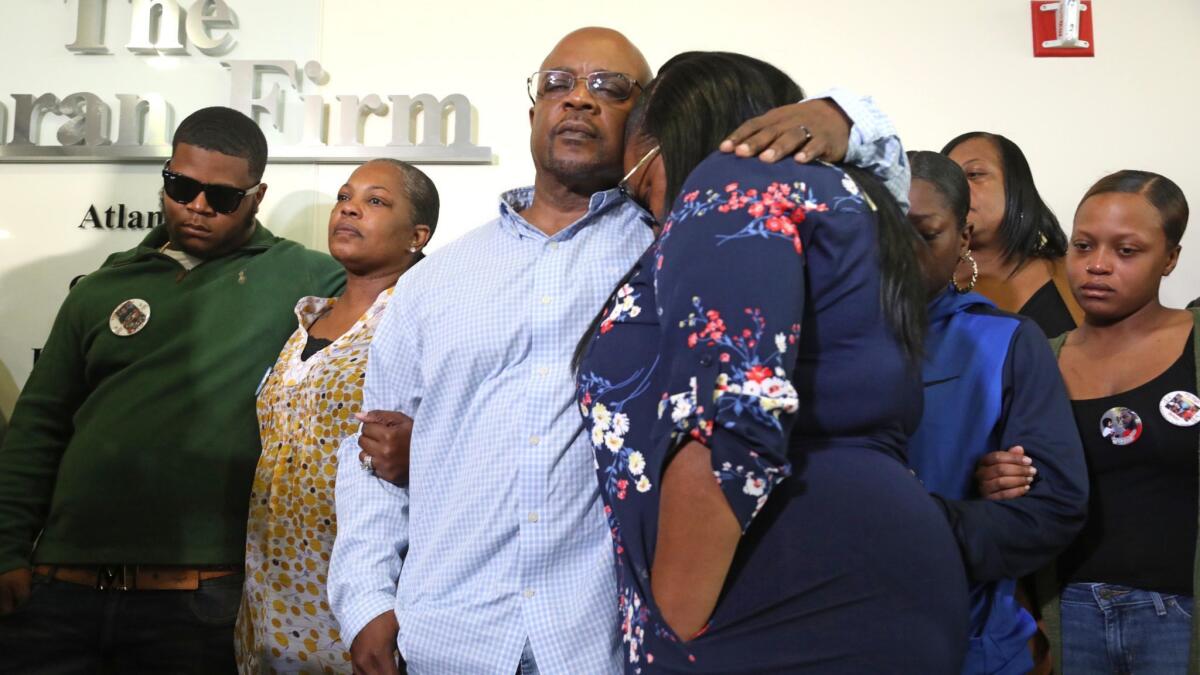L.A. sheriff touts reform despite a record of fighting transparency, civilian oversight

- Share via
Amid growing calls for police reforms, Los Angeles County Sheriff Alex Villanueva took to social media recently to tout the department’s progressive force policies.
He posted a list of eight reforms being pushed by local politicians, with a green check mark next to each.
“One through eight, they’re already in play with the Sheriff’s Department; they’ve been for years,” he said in a live broadcast on Instagram. “We’re constantly reinventing ourself and making sure our policies conform to the law.”
But some of the policies, including the duty to intervene when another officer is using excessive force, aren’t explicitly spelled out in the manual for patrol deputies, which experts say makes them nearly impossible to enforce.
And since taking office in December 2018, Villanueva has reinstated deputies who were fired for dishonesty or using unreasonable force and has snubbed transparency laws, refusing to publicly release records as required by law about misconduct within his ranks.
It’s been a year and a half since the landmark Senate Bill 1421 went into effect, requiring California law enforcement agencies to disclose previously confidential records related to serious uses of force, sexual misconduct and dishonesty. The Sheriff’s Department still has not turned over records requested by watchdogs and news organizations, including The Times, for hundreds of deputies.
“He’s terminated investigations into misconduct, repeatedly come under fire for failing to investigate officers, for taking a stand against efforts to discipline by his predecessors,” said Peter Bibring, an attorney for the American Civil Liberties Union of Southern California. “His relatively brief tenure has been characterized by a resistance to accountability, transparency and oversight.”
Villanueva did not respond to multiple requests for interviews.
The Times has sued L.A. County on multiple occasions alleging California Public Records Act violations. A 2018 lawsuit accused officials of refusing to release information about the status of homicide investigations, mundane information such as email addresses for Sheriff’s Department employees, and records involving prosecutors and others in the district attorney’s office who have been disciplined for sexual harassment or misconduct. The Times also in 2016 contested exorbitant fees that the Sheriff’s Department tried to charge to obtain emails containing certain racist terms sent, received or forwarded by members of the agency’s command staff.
Just before he took office, Villanueva was quoted in L.A. Taco as saying he would settle one of the cases.
“I think the press has a right to know, and acting on behalf of the public and disseminating information to the public. That’s part of transparency. We have nothing to hide. It’s the public’s information. It doesn’t belong to the department. It belongs to the taxpayers,” he was quoted as saying.
Both lawsuits remain pending.
The Times also intervened last year in cases brought by the Los Angeles Police Protective League and the Assn. for Los Angeles Deputy Sheriffs, which sought unsuccessfully to keep records related to discipline and serious uses of force before 2019 confidential.
The ACLU said the Los Angeles County Sheriff’s Department is the only one of 400 agencies in California to flat out deny its request for records under SB 1421, calling the query “too broad in scope.”
At a town hall meeting in October, Villanueva said his agency had produced more than 1,400 records since the bill became law, but still had a backlog of about 3,300 requests. It’s unclear how many of the 1,400 he referenced are in direct response to SB 1421 requests.
“I’m hoping that by the end of the year, we’ll have got at least to the halfway point,” Villanueva said at the time. “And we’ll pick up the pace, as we get more people trained on this.”
Since then, the Sheriff’s Department has produced records about one deputy to the Los Angeles Times. Bibring said the ACLU has gotten none, but two families it represents received some records. Relatives of others killed by deputies say they are also still waiting.

“We haven’t gotten any information,” said Dominique Brown, whose brother, Ryan Twyman, was shot and killed by two L.A. County sheriff’s deputies in June of last year.
The Sheriff’s Department released a video of the incident later that month, showing two deputies firing 34 rounds at a white Kia they say Twyman was driving as the vehicle backed out of a parking space at an apartment complex in Willowbrook.
Authorities said they had been trying to arrest Twyman for several weeks when they spotted his vehicle in the parking lot. Two months earlier, according to police, gang investigators had found guns at his home, but Twyman, who was on probation, was not there.
The video raised questions about whether deputies acted within department policy by firing into the car and whether the use of force was justified.
“Who are these officers, and where are they right now?” Brown said. “We feel like they need to be fired, and we feel like they need to be charged with manslaughter.”
Villanueva has rebuffed other moves for greater oversight.
In March, L.A. County voters overwhelmingly approved Measure R, which gave the Sheriff Civilian Oversight Commission the power to subpoena records and testimony from the Sheriff’s Department. The panel has since authorized two subpoenas, including one in May to Villanueva himself for his testimony on jail conditions during the COVID-19 pandemic.
Villanueva didn’t show up.
“He just ignored it,” Demetra Johnson, whose 16-year-old son, Anthony Weber, was shot and killed by a sheriff’s deputy in February 2018, said of the subpoena. Johnson, a plaintiff in the ACLU’s lawsuit for records, said her requests for documents under SB 1421 related to her son’s shooting were denied. “If we just ignore it, we got a warrant for our arrest…. It’s like they’re above the law, they can do whatever.”
Villanueva questioned the legality of Measure R, and an assistant sheriff attended the commission’s May meeting instead.
That month, Villanueva told residents at a virtual town hall that the oversight panel was acting as “attack dogs” for the county Board of Supervisors, which has long had a strained relationship with the sheriff.
The oversight commission was formed in 2016 after corruption and brutality in the jails led to indictments of several sheriff’s deputies and high-ranking commanders, including former Sheriff Lee Baca. All nine members are appointed by the Board of Supervisors, with five nominated by supervisors and four recommended by community groups.
Patti Giggans, chairwoman of the commission, said even routine requests for information from the sheriff are met with resistance. The commission recently was denied details about a traffic stop in which a deputy is seen in a video reaching inside a car and striking the driver, Giggans said.
Villanueva has said multiple times that he plans to post every document possible on the Sheriff’s Department’s website in the interest of transparency. Giggans called the pledge “baloney” and “distracting.”
“It’s very disturbing that everything you say, anything about the Sheriff’s Department, the sheriff says, ‘Go look it up. I put it up on our website,’” Giggans said. “We’re not toddlers being told how to go use a dictionary.”
Since he took office, Villanueva has clashed with the supervisors over hiring decisions and oversight. The board sued Villanueva over his controversial decision to reinstate a deputy who had been fired for violating department policies on domestic violence and lying, and in August, a judge overturned the rehiring.
The deputy, who has denied wrongdoing, reapplied in March to join the department as a trainee and was placed on an eligibility list. In a letter to Villanueva later that month, the county’s director of personnel said she was rejecting his application.
Villanueva, who defeated incumbent Jim McDonnell in 2018, ran on a platform that included ending cronyism and revisiting cases of deputies who he contended were unfairly disciplined.
The Office of Inspector General reported that in the first five months of 2019, the Sheriff’s Department inactivated 58 administrative investigations. In that same period, the number of administrative investigations it initiated dropped significantly, to 106 from 247 the year before, the office reported.
Lt. John Satterfield said the Sheriff’s Department is updating its policies to make the language better conform to that of the eight reforms that have been proposed by two supervisors and backed for all law enforcement agencies by the national advocacy group Campaign Zero. They include prohibiting officers from firing at people in moving cars unless they pose a deadly threat and requiring a verbal warning before using deadly force.
Last week, the department announced that it was restricting use of carotid restraints, another of the reforms, to when a suspect’s actions threatened a life or serious bodily injury to someone. Deputies were previously allowed to use the restraint when a person’s actions were “assaultive or high risk.”
Satterfield called the change “the right thing to do.”
“The community’s made it clear that this isn’t a force option that they want where it’s currently at,” Satterfield said. “We hear the community, and we’re going to react.”
He said that requiring an officer to intervene to stop another from using excessive force has been part of academy training since the mid-1990s.
“We’re going to leave nothing to interpretation anymore,” Satterfield said. “Policies are going to be tightened up so that all of the training is congruent with the policies.”
Some said it wouldn’t matter.
“They are taught, they are trained — they don’t follow it,” said John Sweeney, an attorney who has represented families of people killed by deputies. In the last several years, he said, he has won nearly $30 million in judgments and settlements.
“What we see every time those kind of measures are codified are the same thing, which is a lack of compliance in combination with an increase in police budgets because they ask for money for training and implementation,” said Lex Steppling, director of campaigns and policy for Dignity and Power Now. “So for us it’s a lose-lose.”
More to Read
Sign up for Essential California
The most important California stories and recommendations in your inbox every morning.
You may occasionally receive promotional content from the Los Angeles Times.











